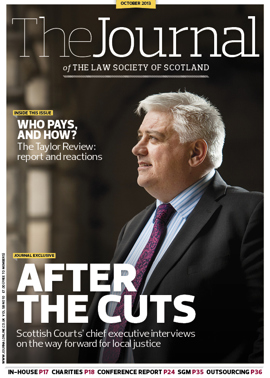Charities and the changing legal landscape

In Scotland, as with the rest of UK, our charity sector is familiar – from large national charities like the National Trust for Scotland to a community hall. The range and scale of work undertaken by charities is enormously broad, providing important local, national and international public benefits and services.
In the past, smaller charities have probably largely avoided taking legal advice, often working from a practical level to identify their beneficiaries and undertake activities to assist or support them. Increasingly, however, charities of all sizes are finding legal issues intrude into their work in such a way that consulting a solicitor may be necessary.
In some important ways, many of these changes stem from the fact that funding can be harder to access. While all charities must focus on furthering their charitable purposes and providing public benefit, they can only do so when funding is available, so funding considerations are often paramount. What I hope to highlight here is that advising charities can require the broadest range of a firm’s expertise, and is not as “niche” (or tied to understanding charity regulation) as may have been assumed.
Strings attached
For example, a long-established charity, registered in England & Wales, whose primary activity is to fund projects throughout the UK supporting its particular charitable purposes, seeks separate registration in Scotland. Why was this necessary? Not because Scots law required registration. This charity had historically received funding from Scottish organisation(s) – and some of those funders were indicating that, in the future, they might restrict their funding only to charities registered north of the border. Therefore, while the client had traditionally taken legal advice from its London lawyers, it found a new need to take Scots law advice to achieve registration with the Office of the Scottish Charity Regulator (OSCR).
Many other examples abound where funders, whether in the public or private sector, are likely to be spending less on charities today and, where they are prepared to fund, may well impose more onerous conditions than in the past. This can lead to further legal issues, such as putting in place security for lending, and meeting conditions precedent prior to the drawdown of funds.
Also, the idea that a funder may alter how a charity is registered or constituted may seem far-fetched, but is not without precedent. A large number of charities are not formally constituted and are shown on the charities register as “unincorporated associations”. In such cases, individual charity trustees may be asked to accept personal liability to obtain funding, a prospect fewer and fewer individuals are keen to do.
Further, the constitution of the charity may affect the form of security that can, or will, be granted. A charitable industrial and provident society cannot grant an effective floating charge at present (although that may change, if a current consultation bears fruit on this issue). A Scottish Charitable Incorporated Organisation (SCIO) cannot grant a floating charge, and is further hampered when addressing debt issues by the gap in SCIO regulations providing no method for a SCIO to declare insolvency if its debts are under £1,500.
Consideration of such restrictions will affect whether charities can obtain funding in the first place and might, in some cases, lead to a review of the constitution of the charity.
Policy implications
Another change in the way charities operate comes from the increasing impact of procurement. A significant number of charities undertake work for organisations that will now only contract for that work after putting it out to tender. This is sometimes a direct result of procurement law, but also arises because of internal policy decisions of the organisation awarding the contract, or conditions imposed on that organisation’s own funding.
In most such cases, charities will compile tender submissions without legal advice. However, when contract awards are announced, one or more charities may lose the opportunity and in some cases have an existing contract end with no replacement, at which point legal questions can, and often do, arise. Can the decision be challenged? What could the charity have done to alter the outcome? Even where a tender is won, difficult legal issues can arise – particularly if the successful tenderer is taking over from an existing provider and TUPE regulations kick in.
Procurement law and TUPE regulations are complex areas, and many charities are ill equipped either to respond well in a tendering exercise, or to make the strongest case for proper compliance with the regulations, without expert legal assistance.
What about other sources of income? Many charities will be paid by, or in part through, welfare benefits received by their beneficiaries. A charity supporting those with disabilities by providing transport may well be paid for its services through disability benefits specifically intended to assist with mobility. Similarly, Scotland’s registered social landlords, of which over 90% are now charities, rely on rental income, and housing benefit will pay a proportion of that income. These sources of income have been affected recently by welfare reforms.
Able to speak out?
As illustrated above, many of the funding changes for charities can be seen as a direct, or indirect, response to the economic and political landscape at present. Therefore, particularly where funding may come under threat, charities are increasingly considering whether or not to comment on the impact of proposed political changes on their organisation. This has been particularly acknowledged by OSCR when it issued guidance in July this year on how charities may comment or campaign in the upcoming independence referendum.
That guidance notes that campaigning – for or against a change in policy or legislation, for example – “is a legitimate way for many charities to achieve what they were set up for, which is to further their charitable purposes”, and can be applied to policies beyond that of independence. OSCR goes on to make the point that supporting a particular outcome in the referendum (and, by extension, any other political policy) “where this support is clearly linked to the interests and purposes of the charity, is not, in itself, advancing a political party and is therefore not in breach of charity law”.
In contrast, a bill due to be considered in the Lords in October is intended to increase restrictions on campaigning by third parties, including charities, in the run-up to general elections. Given that elections for Westminster, Holyrood, Europe and local government are covered, there will not be many periods of time when these restrictions will not apply. A number of charities have already expressed concerns that this bill, if enacted, will stifle legitimate lobbying. It may well be that further legal advice will be required for a charity to be confident what, if any, campaigning it should undertake, whether in relation to the independence referendum or any other policy that may affect the interests and purposes of that charity.
Charities will continue to provide important public benefits throughout Scotland and further afield, often despite changes in the legal, economic and political landscape such as those identified here. In doing so, charities will require funding and a wide range of related legal advice. Therefore, it is incumbent on the legal profession to understand the context in which charities operate and I hope this article has brought a few such current issues to the fore.
In this issue
- Jewel in the crown, or just red tape?
- In the public interest
- Sweeney: room for manoeuvre
- Lost in translation?
- EU Fundamental Rights Agency: the missing link?
- Reading for pleasure
- Opinion column: Stephen Gold
- Book reviews
- Profile
- President's column
- FM officially opens new MBH
- Feeling the squeeze
- Litigation: a numbers game
- Mythbusting! The in-house IT top ten
- Charities and the changing legal landscape
- Heir finding: the sensitive side
- Sign up to boost charity giving
- Law, but not as we know it
- All the permutations
- The truth, the whole truth...
- Shale gas: a complex process
- Expenses up to date?
- Scottish Solicitors' Discipline Tribunal
- Room at the top?
- Here comes the flood?
- SGM decision kills "sep rep"
- Outsourcing: the straight and narrow
- How not to win business: a guide for professionals
- Properly engaged?
- Ask Ash
- Sep rep: what now?
- From the Brussels office
- Law reform roundup






